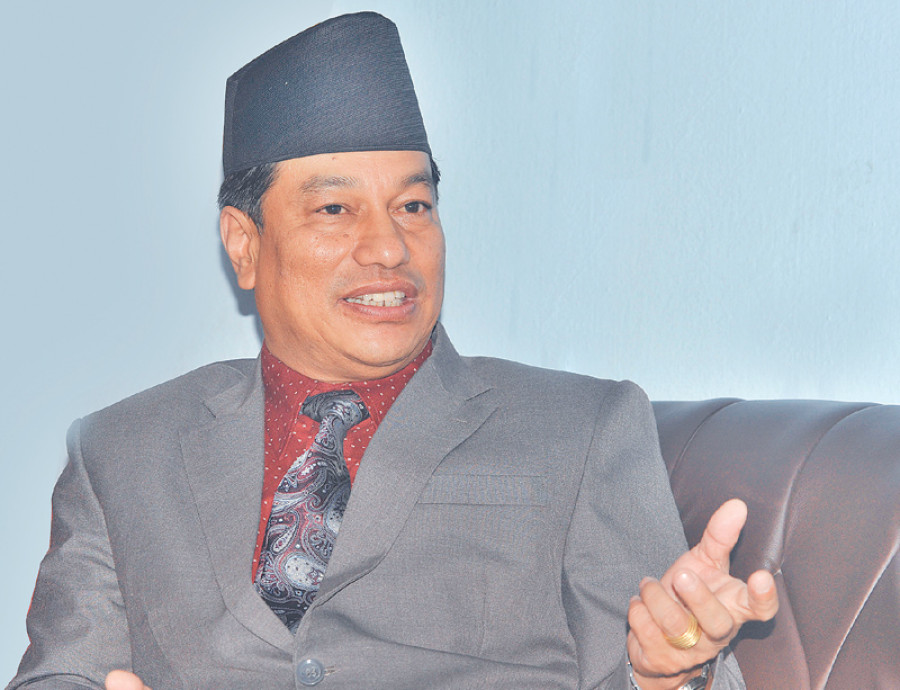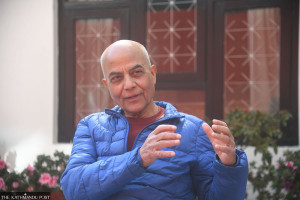Interviews
No amnesty for crime considered serious by international law
Last week, a British court dropped a second charge of torture against Nepal Army Colonel Kumar Lama, who was arrested in London three years ago.
Dewan Rai & Shashwat Acharya
Last week, a British court dropped a second charge of torture against Nepal Army Colonel Kumar Lama, who was arrested in London three years ago. Lama was acquitted of a similar charge in August. He was accused of ordering torture against suspected Maoist detainees when he was in charge of the Gorusinghe barracks in Kapilvastu during Nepal’s decade-long conflict. The case against Lama captured a great deal of attention in Nepal’s public sphere and it reminded both Nepalis and the international community of the serious crimes that had been committed during the conflict. Dewan Rai and Shashwat Acharya spoke with Raman Kumar Shrestha, the recently appointed attorney general (AG), about the lessons from Lama’s case, the process of amending the Transitional Justice Act, concerns about amnesties to grave rights violations, and Nepal’s peace process.
Why is the amendment to the Enforced Disappearances Enquiry, Truth and Reconciliation Commission Act being delayed?
We already have a draft of the amendment, but it still requires a few additions. The fundamentals of the Truth and Reconciliation Commission (TRC) bill will not be changed. This is a long-standing issue with several stakeholders involved, and we do not want to do anything in haste lest we produce something that does not bear fruitful results. The act is closely associated with the victims. They have to get justice. The commissions—the TRC and the Commission on Investigation of Enforced Disappeared Persons (CIEDP)—were formed precisely for this purpose. The TRC has asked for amendments to the law, for which we are holding quick and close consultations.
Could you elaborate on who you are in consultation with and how the process is going?
We are in consultation with various stakeholders—political parties, human-rights activists, the two commissions and the victims of course. The TRC law also requires a law for a special court and the process is almost complete now; I do not think it will take long.
What kind of a special court do you anticipate? How will it be different from the one that exists now?
The existing special court deals with cases of corruption, money laundering, revenue collection and so on. But what we need now is one that handles cases related to transitional justice. The needs are completely different. So the special court that will be created will be fundamentally different from the one that exists and there will be a separate act for it. The previous government had not tabled a bill for creating a special court. But now we are holding discussions about it as well.
There are concerns that the present government will pass a law providing amnesty for serious crimes in violation of international standards or the Supreme Court ruling. To what extent are such concerns justified?
There will not be a general or blanket amnesty. However, that also does not mean that all the cases will be prosecuted. The transitional justice bodies should be allowed to work freely and independently. They should be provided with the necessary human and material resources. They will necessarily be victim-centred as they register victims’ cases. But there is also a popular misconception that the commissions are the be-all and end-all of the transitional justice process. First, TRC identifies conflict-era cases and issues identity cards for the victims. Then it recommends appropriate forms of reparations. Another aspect of the commission’s job is to recommend serious cases of rights violation for prosecution.
Specifically, how do you allay concerns that perpetrators of serious crimes will not be given an amnesty given that the two major parties to the conflict are now in a coalition government?
There are certain established norms of transitional justice. We have put forward seven points that form the basis for the transitional justice process in our country. First, it has to be victim-oriented. Second comes the national law. Third, international human rights law and several international human rights conventions that Nepal is party to. Where there is a clash between national law and such conventions, the latter will prevail.
Fourth is the Supreme Court verdict. Fifth is our national need. Sixth is the Comprehensive Peace Agreement. And the seventh and the final one is the principle of transitional justice.
To allay concerns, I want to emphasise that no crime that is considered serious by international law will be given an amnesty.
Do you see a possibility of one of these—say national need, which can be broadly defined—being misinterpreted to serve a particular vested interest?
The crucial question is: what is it that the country as a whole needs? Do we want to perpetuate the peace process or do we want to end it? As I said, the issue will not be resolved either by granting a general amnesty or by prosecuting every case. Experiences from different countries show that transitional justice is different in each case and is guided by the unique national need of each country.
What can the country learn from Col Kumar Lama’s case?
Two things. First, failure to prosecute serious crimes like torture at home attracts universal jurisdiction. Second, even such cases cannot be prosecuted in the absence of evidence. The government, political parties and human-rights activists would all do well to take serious lessons from both these aspects. I think the case has come to the fore at the right time and it should have some influence in the amendment process we discussed earlier.
Some had interpreted Col Lama’s case as interference in Nepal’s sovereignty.
Nepal is party to certain international conventions. This means it cannot cry foul when cases like torture that fall under universal jurisdiction are prosecuted abroad.
Given that criminalising torture and disappearance is yet to be done, do you think enough is being done to prevent further internationalisation of war-era cases?
The bill on torture has already been tabled. It will be passed with some amendments, if necessary. The bill on disappearance is being discussed and will be tabled soon. We are also doing the necessary homework on the TRC law in accordance with international standards. Existing national laws may not meet international standards. And they do not have a provision for reparations to the victims. Conflict victims will not get justice through the existing courts. At the same time, the perpetrators also have to be punished in accordance with the principle of transitional justice. It cannot be that victims get reparations according to laws on transitional justice but the perpetrators are punished according to the traditional (criminal) justice system.
There has been controversy surrounding cases that have already been registered in regular courts. How do you think they should be dealt with?
There are some who talk without much knowledge of international law. As I said, if the regular courts could provide justice or reparations to the conflict victims, the transitional justice system and the two commissions would not have been necessary.
TRC Chair Surya Kiran Gurung recently expressed frustration and said he might be compelled to resign if the government does not amend the TRC law. How have you assessed the government’s role so far?
The TRC has not been provided with the necessary resources and a conducive environment to carry out its mandate. I have started the process of selecting experts, mostly former government attorneys and justices, for the TRC and the CIEDP. The two commissions have received about 57,000 cases and are sifting them. Some of them could be repeated or fake. Which are genuine war-era cases? Which crimes should be prosecuted? While the process should be victim-centred, we should not forget that the perpetrators are also entitled to the right of a fair trial.
When do you anticipate Nepal’s peace process to come to an end?
Had it been simple, the process would have ended by now. But even those who are benefiting from the perpetuation of the peace process are suffering indirectly. The county’s prosperity has been stalled.
Some, including a few in the government, argue that the peace process is a donor driven agenda. Your thoughts?
There are two extremes here. There are some who have continuously spread the spectre of human rights without much knowledge of international human rights law. They seem to think that only by jailing everyone will justice be served. And there are others who think human rights do not mean anything. Both are wrong. Going back to Col Lama’s case, it took four years and the government had to spend a million pounds. It showed that the cases have to be based on evidence and facts. No one can be jailed without proper evidence. One of the agreements that the current ruling coalition is based on is bringing the peace process to an end. Going by the prime minister’s statements, I think the current government is serious about concluding the process.
What has happened has happened. Now we do not have much time or many options. We have to do everything we can and act fast for a peaceful settlement. We cannot let the country go back into conflict.




 17.12°C Kathmandu
17.12°C Kathmandu




.jpg&w=200&height=120)








